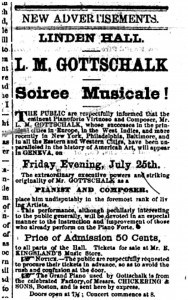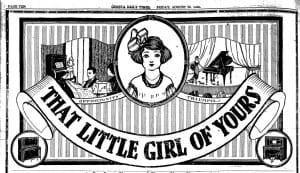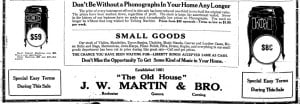Music In Geneva
By John Marks, Curator of Collections and Exhibits
This year we’re embarking on a project with the working title, “Music in Geneva”. (Our first task is to come up with a snappier title, suggestions are welcome.) Growing up in Penn Yan, I came to this job in 2000 with some knowledge of the history of local music. My parents took us to every live music performance they could, which was frequently in Geneva.
I have learned more as I work through the Historical Society archives, but there is much history not written down. We have an impressive list of village “firsts”: a hotel, a post office, a church, and a school. However, no one recorded the first person to bring a piano to town, or the name of the fiddler who played the first dance.
 The first print notices of music in Geneva turn up in the early 1800s. Schools for girls, of which we had several, gave piano or pianoforte lessons as part of preparing them for society. Music was part of church services and public ceremonies. When General Lafayette visited Geneva in 1825, a young lady wrote a song for him: “You left your country and your home/ To bleed for foreign woes/ Columbia’s Sons will ne’er forget/ Their benefactor, Lafayette.”
The first print notices of music in Geneva turn up in the early 1800s. Schools for girls, of which we had several, gave piano or pianoforte lessons as part of preparing them for society. Music was part of church services and public ceremonies. When General Lafayette visited Geneva in 1825, a young lady wrote a song for him: “You left your country and your home/ To bleed for foreign woes/ Columbia’s Sons will ne’er forget/ Their benefactor, Lafayette.”
Until the mid-1800s, churches were the only public music venues, only allowing sacred music. Linden Hall was built in 1855 followed by Dove Hall in 1876, increasing the number and variety of performances. In 1892 fire destroyed Linden Hall which motivated William Smith to lead a community effort to build the opera house named for him. The Regent and the Temple theaters followed in the 1910s. (1861 Music Ad)
 With all these venues, to paraphrase Field of Dreams, they built it and performers came. They were halls for the Geneva Mandolin Orchestra and local recitals, but world-renowned musicians came as well. Alma Gluck sang at the Smith and Louise Homer sang at the Regent. Ignacy Paderewski gave a piano recital in Dove Hall, as well as many other performers whose fame has passed from public memory.
With all these venues, to paraphrase Field of Dreams, they built it and performers came. They were halls for the Geneva Mandolin Orchestra and local recitals, but world-renowned musicians came as well. Alma Gluck sang at the Smith and Louise Homer sang at the Regent. Ignacy Paderewski gave a piano recital in Dove Hall, as well as many other performers whose fame has passed from public memory.
Why did famous musicians play in Geneva, a city of fewer than 8,000 people? The Lehigh Valley Railroad and a branch of the New York Central Railroad ran through town, and we were conveniently situated between bookings in larger cities. The only musical experience through most of the 19th century was a live one. Regardless of fame, musicians had to play to make money; a night off was a night they didn’t get paid.
 In the 19th century music in the home was seen as a measure of moral well-being. The piano was considered the most suitable instrument for young ladies and mass production put more instruments within the reach of families. Owning a piano and affording lessons was seen as a shift from the laborer class to skilled worker. Geneva had a number of music stores in the early 20th century that advertised to these notions.
In the 19th century music in the home was seen as a measure of moral well-being. The piano was considered the most suitable instrument for young ladies and mass production put more instruments within the reach of families. Owning a piano and affording lessons was seen as a shift from the laborer class to skilled worker. Geneva had a number of music stores in the early 20th century that advertised to these notions.
Patented in 1877 by Thomas Edison, the phonograph became very popular in the early 1900s. “By 1915, Americans were spending $60 million annually on phonographs and records.”[i] Many people welcomed having professional music in the home. Wives were freed of the burden of forcing their children to practice piano lessons. Others, like famed band leader John Phillip Sousa, mourned the end of amateur musicians and saw phonographs as the end of music as they knew it.
We will be writing about music in Geneva throughout this year. Our goal is to cover all types of music and all corners of the city. What are your musical memories? What would you like us to include? You can contact me by email jmarks@genevahistoricalsociety.com or call (315) 789-5151.
[i] “The Home Set to Music”, by Jessica H. Foy, in The Arts and the American Home, 1890-1930,edited by Jessica H. Foy and Karal Ann Marling, (University of Tennessee Press: Knoxville), 1994,p. 73.
